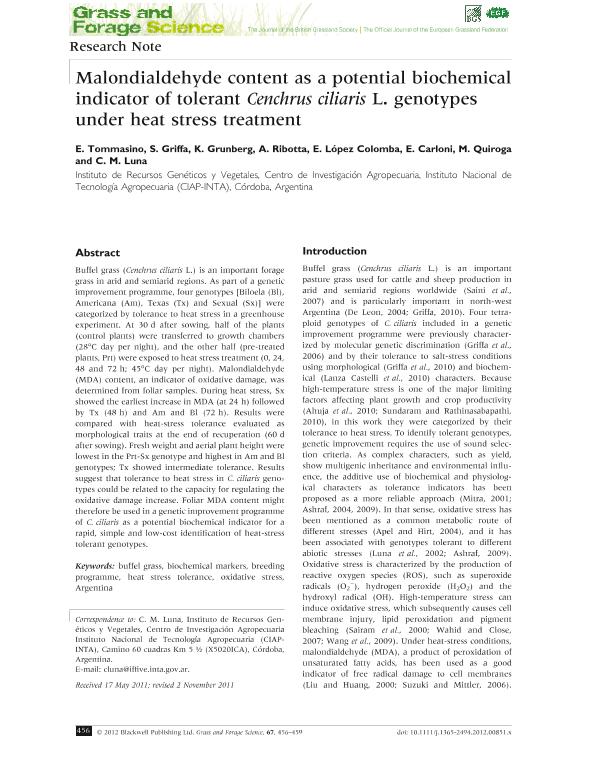Mostrar el registro sencillo del ítem
dc.contributor.author
Tommasino, Exequiel Arturo

dc.contributor.author
Griffa, Sabrina Mariana

dc.contributor.author
Grunberg, Karina Alejandra

dc.contributor.author
Ribotta, Andrea Noemí

dc.contributor.author
López Colomba, E.
dc.contributor.author
Carloni, Edgardo José

dc.contributor.author
Quiroga, M.
dc.contributor.author
Luna, Celina Mercedes

dc.date.available
2023-02-28T17:12:42Z
dc.date.issued
2012-02-03
dc.identifier.citation
Tommasino, Exequiel Arturo; Griffa, Sabrina Mariana; Grunberg, Karina Alejandra; Ribotta, Andrea Noemí; López Colomba, E.; et al.; Malondialdehyde content as a potential biochemical indicator of tolerant Cenchrus ciliaris L. genotypes under heat stress treatment; Wiley Blackwell Publishing, Inc; Grass and Forage Science; 67; 3; 3-2-2012; 456-459
dc.identifier.issn
0142-5242
dc.identifier.uri
http://hdl.handle.net/11336/189136
dc.description.abstract
Buffel grass (Cenchrus ciliaris L.) is an important forage grass in arid and semiarid regions. As part of a genetic improvement programme, four genotypes [Biloela (Bl), Americana (Am), Texas (Tx) and Sexual (Sx)] were categorized by tolerance to heat stress in a greenhouse experiment. At 30d after sowing, half of the plants (control plants) were transferred to growth chambers (28°C day per night), and the other half (pre-treated plants, Prt) were exposed to heat stress treatment (0, 24, 48 and 72h; 45°C day per night). Malondialdehyde (MDA) content, an indicator of oxidative damage, was determined from foliar samples. During heat stress, Sx showed the earliest increase in MDA (at 24h) followed by Tx (48h) and Am and Bl (72h). Results were compared with heat-stress tolerance evaluated as morphological traits at the end of recuperation (60d after sowing). Fresh weight and aerial plant height were lowest in the Prt-Sx genotype and highest in Am and Bl genotypes; Tx showed intermediate tolerance. Results suggest that tolerance to heat stress in C. ciliaris genotypes could be related to the capacity for regulating the oxidative damage increase. Foliar MDA content might therefore be used in a genetic improvement programme of C. ciliaris as a potential biochemical indicator for a rapid, simple and low-cost identification of heat-stress tolerant genotypes. © 2012 Blackwell Publishing Ltd.
dc.format
application/pdf
dc.language.iso
eng
dc.publisher
Wiley Blackwell Publishing, Inc

dc.rights
info:eu-repo/semantics/openAccess
dc.rights.uri
https://creativecommons.org/licenses/by-nc-sa/2.5/ar/
dc.subject
ARGENTINA
dc.subject
BIOCHEMICAL MARKERS
dc.subject
BREEDING PROGRAMME
dc.subject
BUFFEL GRASS
dc.subject
HEAT STRESS TOLERANCE
dc.subject
OXIDATIVE STRESS
dc.subject.classification
Bioquímica y Biología Molecular

dc.subject.classification
Ciencias Biológicas

dc.subject.classification
CIENCIAS NATURALES Y EXACTAS

dc.title
Malondialdehyde content as a potential biochemical indicator of tolerant Cenchrus ciliaris L. genotypes under heat stress treatment
dc.type
info:eu-repo/semantics/article
dc.type
info:ar-repo/semantics/artículo
dc.type
info:eu-repo/semantics/publishedVersion
dc.date.updated
2023-02-27T17:43:57Z
dc.identifier.eissn
1365-2494
dc.journal.volume
67
dc.journal.number
3
dc.journal.pagination
456-459
dc.journal.pais
Reino Unido

dc.journal.ciudad
Londres
dc.description.fil
Fil: Tommasino, Exequiel Arturo. Instituto Nacional de Tecnología Agropecuaria. Centro de Investigaciones Agropecuarias. Instituto de Fisiología y Recursos Genéticos Vegetales; Argentina
dc.description.fil
Fil: Griffa, Sabrina Mariana. Instituto Nacional de Tecnología Agropecuaria. Centro de Investigaciones Agropecuarias. Instituto de Fisiología y Recursos Genéticos Vegetales; Argentina
dc.description.fil
Fil: Grunberg, Karina Alejandra. Instituto Nacional de Tecnología Agropecuaria. Centro de Investigaciones Agropecuarias. Unidad de Estudios Agropecuarios - Consejo Nacional de Investigaciones Científicas y Técnicas. Centro Científico Tecnológico Conicet - Córdoba. Unidad de Estudios Agropecuarios; Argentina
dc.description.fil
Fil: Ribotta, Andrea Noemí. Instituto Nacional de Tecnología Agropecuaria. Centro de Investigaciones Agropecuarias. Instituto de Fisiología y Recursos Genéticos Vegetales; Argentina
dc.description.fil
Fil: López Colomba, E.. Instituto Nacional de Tecnología Agropecuaria. Centro de Investigaciones Agropecuarias. Instituto de Fisiología y Recursos Genéticos Vegetales; Argentina
dc.description.fil
Fil: Carloni, Edgardo José. Instituto Nacional de Tecnología Agropecuaria. Centro de Investigaciones Agropecuarias. Instituto de Fisiología y Recursos Genéticos Vegetales; Argentina
dc.description.fil
Fil: Quiroga, M.. Instituto Nacional de Tecnología Agropecuaria. Centro de Investigaciones Agropecuarias. Instituto de Fisiología y Recursos Genéticos Vegetales; Argentina
dc.description.fil
Fil: Luna, Celina Mercedes. Instituto Nacional de Tecnología Agropecuaria. Centro de Investigaciones Agropecuarias. Instituto de Fisiología y Recursos Genéticos Vegetales; Argentina. Consejo Nacional de Investigaciones Científicas y Técnicas; Argentina
dc.journal.title
Grass and Forage Science

dc.relation.alternativeid
info:eu-repo/semantics/altIdentifier/doi/http://dx.doi.org/10.1111/j.1365-2494.2012.00851.x
dc.relation.alternativeid
info:eu-repo/semantics/altIdentifier/url/https://onlinelibrary.wiley.com/doi/10.1111/j.1365-2494.2012.00851.x
Archivos asociados
